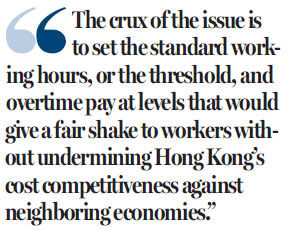Standard working hours a social issue
Updated: 2016-05-31 07:32
By Peter Liang(HK Edition)
|
|||||||||
Peter Liang writes that fixing the working week will give a fair shake to Hong Kong employees who are more concerned with quality of life than hustling for extra money
A recent study which shows Hong Kong people work longer hours than their counterparts in other developed economies has given a timely boost to supporters of standard working hours in the government-initiated public debate.
Local labor groups and social activists have been calling for the introduction of a standard working hours law. Without such a law, they argue, workers are subject to being coerced by employers to put in more time than the commonly accepted eight-hour work day.
Understandably, they have staunchly objected to the employers' counter-proposal of allowing working hours to be determined individually by contractual agreements between employers and employees. This, they contend, would never be a negotiation between equals because the employer would always have the upper hand.
But experiences in other developed economies have shown that setting standard working hours is not as simple and straightforward an exercise as many people may have thought. The statutory 35-hour work week has made French workers the envy of their counterparts from around the world. But anyone who has ever worked in a profession in Paris will know better.

The short work week, long lunches and even longer vacation time in France and some other European countries are a myth waiting to be debunked, according to a BBC report. Professionals working in Paris toil as hard and as long as their counterparts in other cities. Most of them work about 45 to 50 hours a week on average, the BBC report says.
The only difference is that in France, the 35-hour workweek draws the line above which overtime pay kicks in. In contrast, there is no such statutory threshold in Hong Kong. Rewards for putting in extra time at work are at the discretion of the employers, who maintain that such "flexibility" is essential to keeping Hong Kong's economy competitive.
To bolster their point, they have cited the move by France to reform its short working week introduced by a socialist government in the 1990s to help create jobs. The idea was that employers would be forced to hire more workers when everybody worked shorter hours.
Apparently, it did not work according to the socialists' plan. Unemployment in France, especially among the young, has remained stubbornly high. Instead of hiring more people which would result in an increase in fixed overheads, many French employers have opted for the flexibility of paying their workers to work overtime only when there is the need to complete specific jobs.
Even that is too much a cost to be borne by French employers. Their complaints of lost competitiveness have prompted the government to revise the law by giving employers the right to renegotiate longer work hours and lower overtime pay with employees.
It seems that the French have come full circle to the starting point where Hong Kong is now. But before knocking down the idea of standard working hours, opponents of the proposal should bear in mind that workers in France are much better organized than those in Hong Kong, giving them stronger bargaining power in negotiating with employers.
Negotiable work hours and overtime pay is obviously an unfair arrangement to Hong Kong workers, exposing them to coercion and exploitation. The crux of the issue is to set the standard working hours, or the threshold, and overtime pay at levels that would give a fair shake to workers without undermining Hong Kong's cost competitiveness against neighboring economies.
Nearly every developed economy has standard working hours; they should serve as references for Hong Kong when it comes to setting its own.
It is also important to listen to workers to ascertain whether they prefer longer standard working hours and higher overtime pay or the other way round. Indeed, more people in Hong Kong are saying they want to have the option of spending more time with their families. Such desire is a reflection of rapidly changing social trends which are fast gaining ground.
Unlike their predecessors, workers in Hong Kong are showing greater concern about improving their quality of life rather than just making a few more dollars. That is what the debate on standard working hours is all about. It's more a social than an economic issue.
The author is a veteran current affairs commentator.
(HK Edition 05/31/2016 page12)